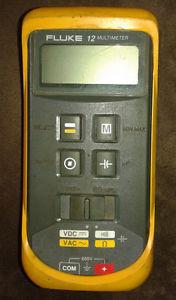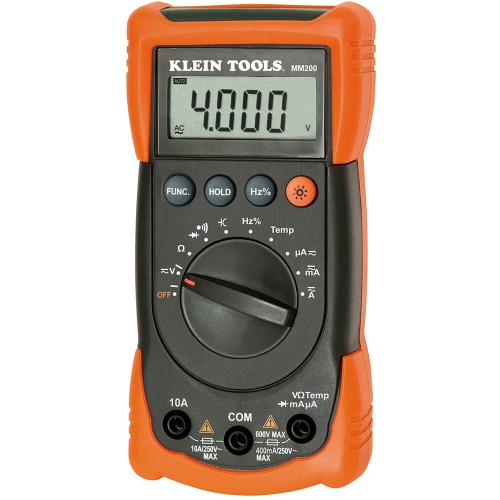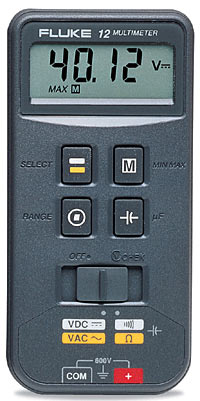DMM Recomendations
12
12
|
Fathers Day is coming up and I was thinking a new multimeter would be better than novelty socks and a mug or something else i'll never use. I'd like one with all the knobs and whistles(if you know what I mean) especially capacitance testing function for the values we use, as the one I'm using now doesn't have that feature.
Sensible price please(I need my cash for my stash). What do you guys use? Any good recommendations? Thanks and regards. bogey 
|
|
Administrator
|
my dad gave me his old fluke 12, but it's been replaced with the 115 or 17b i think. but, he used it for work for ever and the thing is a fucking tank. not saying he was abusive to it, my dad is a repairman, so it got used pretty much every day, and my dad travels every day.
for me, i just need the be able to test capacitance, resistance, voltage, and continuity accurately and well. i think everything else is just a waste of money for us, IMHO. plus for testing transistors, diodes, and such i have my DCA75. i'd rather have tools that are more specialized, but are very good at what they do, rather then tools that can do a little of everything, but not as well. oh, and the screen can be bent to face you, and it has a built in stand. not mine, but this is how it looks. clean simple and easy to find everything. 
|
|
In reply to this post by bogey
Fluke is definitely one of the top makers, and they last forever. The price reflects that as well starting at over $100 and going way up. Even their probes prices give me sticker shock ($30 apiece sometimes)
Even in eBay or Craigslist they are a fortune, because they are good. On the other hand - there are many kinds of DMMs out there for under $50 that will do everything you need. This one was recommended to me by a friend for $10: http://www.amazon.com/Etekcity-Digital-Multimeter-Voltmeter-Ohmmeter/dp/B00B7CS3UY/ref=zg_tr_tab_pd_mw_1 Test transistors, audible continuity tester, etc. For the price it is a steal. It does everything I need. Or you can go somewhere in the middle - just make sure it is made mostly for DC, not an AC electrician, so you aren't buying stuff you don't need. Of course, If you want the best go with Fluke (My dad never bought a Fluke meter, but he bought stock in the company back in the 1970s, back when all you got were paper certificates. It is now part of Danaher). |
|
In reply to this post by bogey
I use a Klein Tools MM200 I picked it up at Home Depot for $45. The only thing I wish it had was a HFE function but I have a cheap dmm that covers that. I've been super happy with the Klein especially for the low price. http://t.homedepot.com/p/Klein-Tools-Digital-Multimeter-MM200/202521267

Give a man a match and he'll be warm for a day.
Set a man on fire and he'll be warm for the rest of his life. |
|
Administrator
|
Trust me, you don't want the hfe function of your DMM, typically they're way off and unreliable, IME especially for vintage Si transistors and higher gain ones. When I say off I mean some would read them as 18000hfe, when they were really closer to 450hfe.
I'm not a wealthy man by any means, but I can tell you when it comes to tools for this stuff, get a dca55. I bought mine when I started with Ge transistors, but the thing will tell you pinout for everything, so if you can't find the data sheet, no worries and no searching. You can find the forward voltages for diodes so you can match them. Well worth the $70-100. I upgraded to the dca75, Chris actually has my dca55 now, but I upgraded because you can hook it to your computer for updates and various features for jfet testing and matching. But that's closer to $200, so unless you're going to really use it, the dca55 is fine and an invaluable tool. |
|
In reply to this post by bogey
Bogey, I have just seen this on ebay - and not too far from you. An old school monster for just 40 quid, and these things are awesome.
http://www.ebay.co.uk/itm/Micronta-LCD-Benchtop-Auto-Range-Digital-Multimeter-22-195A-Radio-Shack-/111661748238?pt=LH_DefaultDomain_3&hash=item19ff8f100e Otherwise if I was you, I would go for a CHEAP auto range DMM, and a Atlas Peak tester. Use the auto ranger for basic continuity testing and measuring resistors, and the Atlas for all your transistor and diode needs. I still don't have an Atlas yet, but I'm working on it. Flukes are great, but they are made for years of abuse by electricians and service engineers, so the prices reflect this. If you you see one cheap though, snap it up. |
|
HaHa nice one Beaker.
I was looking at that only this morning and it seemed like a good deal even though I have no idea what I really want. More research needed before I decide to part with my cash. Even though it's a present from the kids I inevitably end up paying myself. Thank You to everybody for taking the time to advise. I AM ENLIGHTENED AND GRATEFUL |
|
I do agree about the cheap hFE testers. Mine died after a few months. When it worked it did seem pretty good, but now as R said, I almost always get a reading of 000 (which means it is broken), and once in a while I get 1000 or more - which is obviously wrong.
That DCA75 looks great - but it is pricey. |
|
In reply to this post by bogey
The mid range DMM are not really any better than the cheap ones. They add a transistor HFE tester, but as Rocket says, thet are horribly innacurate, and only of use for determining which leg is which. Even then, they only measure up to 1000, so Darlington transistors are out of range.
They are usually not auto range either, so measuring resistor values is a faff. As Pul says too, they break alarmingly easily - I have gone through three of them so far, but fortunately I was given them for free. The cheap ones omit the transistor tester, but you can still use them to test transistor legs orientation, using the diode test function if you know how, (it's easy, just takes a little longer than the built in tester). |
|
In reply to this post by motterpaul
By the way - for most of what I see, the main difference between the cheaper ones ($12) and the more expensive ($30) is that the more expensive are auto-ranging. I don't think it takes long to learn how to select the right range for almost any component. (it's logical)
For example - with DC the range choices are 2 or 20, 200, 600, so you know you need 20 with 9v circuit, since 2 isn't enough (you can go up to 600v dc if you are doing guitar amp output tubes). For resistors the range is obvious and if you guess wrong no damage is done, you just switch until you get a good reading. The Flukes and some others (Mastech MS8261) have real capacitor testers, which most cheap ones don't have, but caps are well marked, and you can see whether they are good or bad on a cheap DMM once you learn the process (which is easy). Same with diodes. But you do not get exact readings. I guess some meters in the $50 range give you exact readings. (Mastech MS8261) I was just pricing Flukes and they are great, but they start at about $350 here for the basic model. The Mastech is about $40 - but I know nothing about it. Reviews seem good, though. |
|
I have this one. Bought it off work when we got some new ones  I love it. Build quality is beyond top notch. Reminds me of the old saying: Cheap, accurate, reliable. Pick 2. |
|
Administrator
|
In reply to this post by motterpaul
Called up fluke the other day to ask them what's the equivilent to my 12, and they said the 116, but the fluke 117 is $10 more and you get a but more for the money. Hope you're sitting down for the price......$160. It's actually not expensive at all for what you get, not to mention the quality, and reliability. Here's a link to when I found it for that price.
|
|
In reply to this post by Sensei Tim
I've used those in school. They're reeeeealy nice meters.
Through all the worry and pain we move on
|
|
In reply to this post by bogey
Okay then based on the advice of my gurus here this is what I'm thinking.....
http://www.maplin.co.uk/search?text=Maplin+Pocket+Sized+Autoranging+Multimeter http://www.maplin.co.uk/search?text=Atlas+DCA55+Semiconductor+Analyser Am I on the right lines? Are these decent prices? I already have a half decent dmm , it just lacks the cap test function. So do I have everything covered? Why do I always feel like I'm being raped by Mapllin? Comments appreciated. |
|
Honestly there is Fluke which is about the only thing pros use - then there are a bunch of decent consumer models which are all just a matter of what features you want. The price seems good. If it breaks down you buy another, but my $10 model has been with me for over year and all is well except the HFE which died.
For the price, with autoranging, your meter seems to be good value. Mine doesn't autorange. I am not sure what the difference is between the DCA55 and the DCA75 but at twice the price it should good. I see the 75 does Germaniums (older technology), but I'm not sure what else it does that the 55 does not so. The 75 seems to be more detailed and auto-sensitive, so I am guessing it is more versatile and intuitive. But some more detail would be good to hear. |
|
In reply to this post by bogey
Bogey, that auto-ranger is just what I'm talking about. I have one that is functionally almost identical - just a much older version. I have had it for years, and it is still going strong. It is my go-to for general testing use.
The Atlas is The bomb, by all accounts. For what it's worth, I hate Maplin too, I have one in town, but almost never use it. They do have a good range of multimeters though, for reasonable prices - though you might find similar for cheaper online. DO check out Atlas' website, as they have special offers, and their postage is only a three quid for any order. They are in Buxton, Derbyshire. They are currently offering the DC55 along with the LCR40 resistor/capacitor tester in a case for only £132 which is pretty good. http://www.peakelec.co.uk/content/products.html |
|
Hi Beaker.
I had checked out that deal but I can't justify the extra £80+ for the LCR40. As for the cheapo Maplin meter it's only really for testing capacitors. They are the only electronics store near me so sometimes I just have to use them. And Rocket. Funnily enough I had a Fluke meter but I gave it to an apprentice as a gift when I left a job about ten years ago  And Paul. I'm pretty sure the DCA55 measures germaniums(the 75 is an upgrade that you can hook up to your computer. but that's not for me...it's took me half an hour to type this COMPUTERS DON'T LIKE ME!!!) So I think my minds made up. Thank you all for your invaluable help and advice |
|
"Hi Beaker.
I had checked out that deal but I can't justify the extra £80+ for the LCR40." I know what you mean - neither could I. Might be worth getting the DCA55 direct from Atlas though when you have the money. |
|
Administrator
|
Man, that was one nice going away gift. The main difference between the dca55 and dca75 is thst the dca75 can test FETs, while the dca55 will only give your the gate nothing else.
I had the dca55 when I started getting into Ge builds and wanted it to sort the transistors, because I felt it was too time consuming to use the layout and math, I had over 500 Ge transistors coming to me at the time. By far one of the best tools I've bought up until that point. I was able sort Si transistors to match them for bmp's, and in some of my favorite builds I could see what transistors I felt sounded best, then find hfe so I can replicate it. You can match diode forward voltages of diodes. I recently got the dca75, because I wanted to start doing a lot more with FETs, and having a tool that will give you the info you need in a matter of seconds is just incredible. I was able to find a match set for the phaser I build in no time. As far as hooking it up to your computer you can. It allows you to do the software updates without having to send it back to them, for me in the us, that's a huge plus. The other reason is that it comes wiht software to allow you to view information on the dca75 on your computer screen, and gives you additional info. Do you need the dca75? Probably not, unless you're doing a lot with FETs. Even then it's really a matter of opinion. Both are incredible, and invaluable tools. My suggestion grab a dca55, and if at any point you feel you could use the dca75, then sell the dca55 and get a dca75. The do not lose their value, not to mention I'm sure someone on the forum would love to buy it, if you were to upgrade. Chris ended up wanting one and bought mine, so I ended up getting the dca75. |
|
In reply to this post by bogey
Just an update and some info that some people may find useful.
I went ahead and made the two purchases which I referred to in an earlier post and here are my findings. First up.......The DCA55. Does everything it says it should. Very easy to use and understand. A lot more robust than I had imagined. Makes tea and toast if you ask it nicely. 10/10  And the multimeter.......Okay little meter with handy auto ranging but wouldn't measure caps below 1nF so not really what I was looking for.  Took the meter back and got this one instead http://www.maplin.co.uk/p/precision-gold-pg017-digital-multimeter-gw24b Half price @£20 bargain I'd say. I think the picture must be of an older model as mine has slots into which you insert the capacitor.(like this one)http://www.maplin.co.uk/p/precision-gold-digital-multimeter-gw20w Popped in a 5pF cap and bingo.....measured it straight away. Happy Days. I think I can now test nearly all my components before I build, so if any of my builds don't work I've only got myself to blame. But I know where there are lots of people to help me when that inevitably happens!!!!!!!!!!!!!!! 
|
«
Return to Open Chat
|
1 view|%1 views
| Free forum by Nabble | Edit this page |

